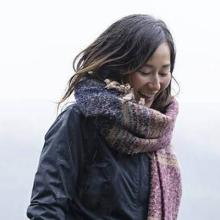Rachel Dickens
Why did you decide to pursue a graduate degree?
I am a mixed ancestry Ts’msyen woman from Lax Kw’alaams who has been trained in the biomedical model of care as a Registered Dietitian and Certified Diabetes Educator. My work as a healthcare provider within First Nation communities has illuminated the failures of the dominant healthcare model. I continue to bear witness to the burden of type 2 diabetes on our peoples, impacting not only our individual health, but also our collective health, and our spiritual, emotional, and mental well-being. We must move away from this dominate biomedical approach to diabetes care, with its embedded values of individualism and control, towards a model of care that holds value in holism, collectivism, and Indigenous ways of knowing and healing. Through my graduate degree, I hope to work alongside other Indigenous scholars and Indigenous communities to reimagine a new approach to diabetes care. By grounding approaches to diabetes care within an Indigenous Food Sovereignty framework, we can begin to conceptualize health and well-being through reciprocal land-based practices, embedded in a self-determining agenda, to reconnect our peoples with the healing properties of our food systems in their entirety. I believe this approach will not only improve the health and well-being of Indigenous peoples and our future generations, but will also support the health of the wider population.
Why did you decide to study at UBC?
My Ph.D. studies at UBC in Integrated Studies in Land and Food Systems has allowed me to work with Dr. Tabitha Robin (Martens), an Indigenous scholar whose practice and research is embedded in love and care for the land. Working alongside Dr. Robin has allowed me to explore diabetes care that is embedded within an Indigenous Food Sovereignty framework, moving away from individualistic, biomedical definitions of health, fostering empowerment and self-determination for our peoples.
Additionally, the UBC’s 2020 update to the Indigenous Strategic Plan (ISP), a response to the Truth and Reconciliation Commissions’ 94 Calls to Action, the National Inquiry into Missing and Murdered Indigenous Women and Girls’ Calls for Justice, and an endorsement of the United Nations Declaration on the Rights of Indigenous Peoples (UNDRIP), is a step towards indigenizing the university. This not only makes the university a safer space for Indigenous peoples, but also centers Indigenous knowledge systems as an indispensable tool in the pursuit of knowledge, while making space for culturally responsive curriculum and pedagogy.
What is it specifically, that your program offers, that attracted you?
Land and Food Systems is also where the Dietetic Program is housed. I see my graduate pursuit in Integrated Studies in Land and Food Systems as an opportunity to work towards an approach to Indigenous health and well-being that is grounded in relationship to land and Indigenous knowledge systems, while also drawing upon the strengths of biomedical healthcare. By embracing a two-eyed seeing approach, my work will focus on how these differing worldviews might coexist together in a non-assimilative manner.
What was the best surprise about UBC or life in Vancouver?
As an Indigenous Dietitian working within First Nation communities it has been essential to continue building relationships and providing diabetes services within the communities I work in during my graduate studies. The many challenges of being a remote student have been offset by my supportive committee.
What advice do you have for new graduate students?
Surround yourself with like-minded people, and do research that is close to your heart.
